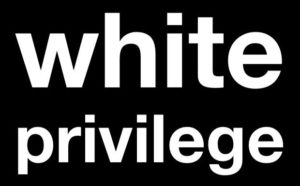Does White Privilege Really Exist?
[AdSense-A]
Privilege. Just what does this word mean? For so many of us, privilege conjures up images of celebrities owning homes in Europe or having memberships at exclusive resorts. People who earn six figure salaries or own million-dollar homes viewed as privileged by many poor and middle-class people and they are not wrong. We equate privilege with wealth. But there is a different type of wealth. It is one that has nothing to do with a person’s bank account and everything to do with one’s skin color. It is called white privilege.
As a young black girl growing up in California, I had never heard of white privilege. In fact, I always considered myself privileged. My parents divorced when I was 10 years old, but my mom worked hard as a single mom, and paid for me to attend a Catholic elementary school. She also paid for me to attend an all-girls, Catholic college preparatory high school. My mom also raised me in a middle-class neighborhood.
Today, as a married mother of five biracial children, my family is part of the shrinking middle class. We are rich in love, but not in money. Yet, I have seen white privilege in action. My husband is a charming, blue eyed white man. We have been met with both kind and unkind stares from both white and black people as we walk down the street together. But the differences in how we are treated by others at times, become quite clear when we are out living life individually. For instance, my husband once entered a restaurant in a predominately poor, white neighborhood in California. His experience was normal, one most any parent would have while out and about with their children. When I entered that same restaurant without my husband, I got stares. Why? Reason number one, I was the only black person in that restaurant. Reason number two, I was with children who have a lighter skin color than I do. Three of my children have white skin like their father. Two of my children have brown skin. So, when I enter that same restaurant with just my white children, I have white people looking at me wondering what my relationship is to them. Is she a stranger to them? Do they know her? Once my children call me mom, usually the staring stops.
If my husband enters a store with one of our children, no one questions him as to his relationship to them, regardless of skin color. If I enter a store with one of our white children, I may get strangers asking me if I am their mother. My husband does not have to worry about people judging him as he is out anywhere with our children. If one of our children has a tantrum while at a store, it is not a big deal. My husband just takes them outside or back to our car. People sometimes stare when a child has an outburst in a store, but then go about their business. But as a black mom with biracial children, when I have been out with our children who look white, I have worried that someone might try to call the police on me when I got stares because they were having a temper tantrum in a store. Will someone think I’m trying to kidnap this child? These are privileges that do not cost one cent but are awarded to white people in our society just based on the color of their skin.
Living in America means having lots of freedoms. Legally, I can move to any state, to any neighborhood that family and I can afford. My marriage is accepted in all 50 states. But I know that moving to certain areas in our country will bring challenges to me and to my family. It is one of those things that my white husband never has to think about. He could close his eyes, pick a state, move there and be well received. When I think about moving out of California, I have this anxiety based on the state or the area my husband is interested in moving us to. I ask myself, will my family be well received there? Will I encounter stares, comments every time I run an errand alone or with my kids? These issues are just some of the things I think about as a black woman and a black mother living in America. And it barely scratches the surface of the advantages white people have in our country solely because of their skin color.
Will white privilege ever go away? I do not know if there’s an easy answer to that question. My five children do not understand white privilege. They do not understand racial bias or racism. In our home, our children see the differences in their unique skin tones, but it is just that: skin. Their judgements of one another are solely based on character. Perhaps our society could get there too, as we really get to know people outside of our own skin tones and comfort zones, and as we care enough about our neighbor as we do about ourselves, enough to demand equality for all. Perhaps one day white privilege could become a distant memory.
[si-contact-form form=’2′]


